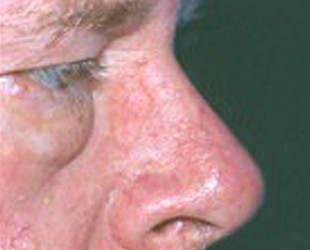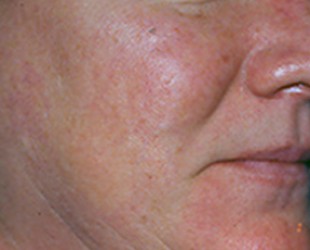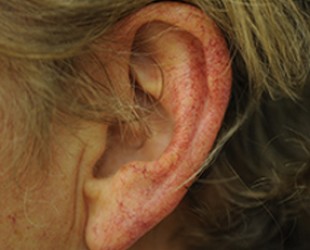What is Rosacea?
Rosacea is a common skin condition, affecting an estimated 14 million Americans. Rosacea isn’t uncomfortable physically but can be difficult to live with emotionally, causing a person to be embarrassed when he or she has an outbreak. This can make the person self-conscious, leading them to avoid social situations until their flare-up has subsided.
Dr. Khatri can help. He can work with you to control and treat your rosacea, helping you understand the potential triggers that are behind your flare-ups with our Laser Treatment For Rosacea.

Schedule a Consultation
To learn more about Rosacea laser treatments, please contact us today at (617) 381-1717 or send us a message below to schedule a consultation.
Who gets rosacea? Is it hereditary?
Anyone of any background or race can develop rosacea, but it is more likely in certain people. It appears there is a genetic tendency toward developing it. These are the typical parameters for those most likely to have rosacea:
- Between the ages of 30 and 50
- Fair-skinned, often with blonde hair and blue eyes
- Celtic or Scandinavian ancestry
- Family history of rosacea or severe acne
- Likely to have had severe acne, usually the cystic form
- Women are more likely, although men develop severe rosacea more often
What causes rosacea?
Rosacea isn’t fully understood, but it’s thought to be caused by a combination of genetic and environmental factors. It also may have an immune function association. Contrary to what some believe, a lack of personal hygiene does not cause rosacea. The red skin or rosacea can make others think it is a contagious rash, but rosacea is not contagious.
What are the symptoms of rosacea?
These are common signs and symptoms of rosacea:
- Facial redness — Persistent redness in the central area of the face. Small blood vessels on the nose and cheeks often swell and become visible.
- Swollen red bumps — People with rosacea may develop red bumps that resemble acne. They may contain pus, and the skin may feel hot and sensitive.
- Eye problems — About half of the people with rosacea have eye dryness, and irritated swollen reddened eyelids.
- Enlarged nose — In rare cases, rosacea can cause the skin on the nose to become thicker. This makes the nose appear bulbous. This occurs more in men.
What are triggers for a rosacea flare-up?
A number of factors can trigger an outbreak or aggravate your symptoms because they increase blood flow to the surface of the skin. These factors include:
- Alcohol
- Spicy foods
- Hot drinks
- Temperature extremes
- Sun exposure
- Wind exposure
- Emotions
- Exercise
- Cosmetics
- Drugs that dilate the blood vessels
Can I get rid of my rosacea permanently?
There isn’t a cure for rosacea. For Dr. Khatri, he plays a double role for his rosacea patients: treatment and education. Controlling rosacea is partially understanding the above factors that can trigger a flare-up.
Treatment focuses on controlling those flare-ups through a combination of skincare, possible light treatments, and medications. Still, recurrences are common.
Where do people get rosacea?
Rosacea mainly affects the facial skin. It can also appear on the chest, back, or neck, but this is less typical.
How is rosacea treated?
The key to treating rosacea is to provide both treatment of flare-ups and education as to potential triggers causing those flare-ups. There is no cure.
At Skin & Laser Surgery Center of New England, Dr. Khatri uses three types of drugs for treating rosacea:
- Medications to address the redness — The drug brimonidine is effective for reducing redness. When applied topically to the skin it works to constrict the blood vessels. Other topical products that reduce redness and the pimples with mild rosacea are azelaic acid and metronidazole. These drugs take from 3-6 weeks to improve rosacea.
- Oral antibiotics — Oral antibiotics, such as doxycycline, may be used to fight the inflammation showing in pimples and bumps.
- Isotretinoin — This powerful acne drug also helps to clear up acne-like lesions stemming from rosacea.
Rosacea/Facial Vessels Before & After






Light treatments and triggers
We’ve had good success with light treatments, such as intense pulsed light and pulsed dye lasers. They can treat the broken capillaries, lessening the redness.
Beyond that, Dr. Khatri can isolate the triggers that are leading to your flare-ups. Educating you about these can help you avoid or minimize these foods or behaviors that are aggravating your rosacea.
Sun protection is very important for rosacea patients. Wearing sunscreen with at least SPF 30 is crucial. Hats and protective clothing are helpful, as well.
Your skincare regimen can also involve triggers. Actions such as scrubbing the skin can cause a flare-up. Many skincare products and cosmetics can irritate your skin.
What happens if I don’t treat my rosacea?
Rosacea doesn’t become worse without treatment. It is what it is. Most people opt to come to see Dr. Khatri for treatment simply to avoid the embarrassment of flare-ups.
